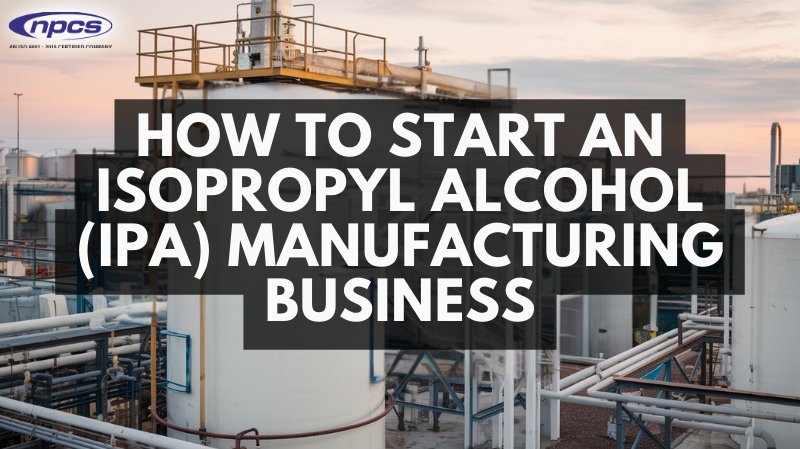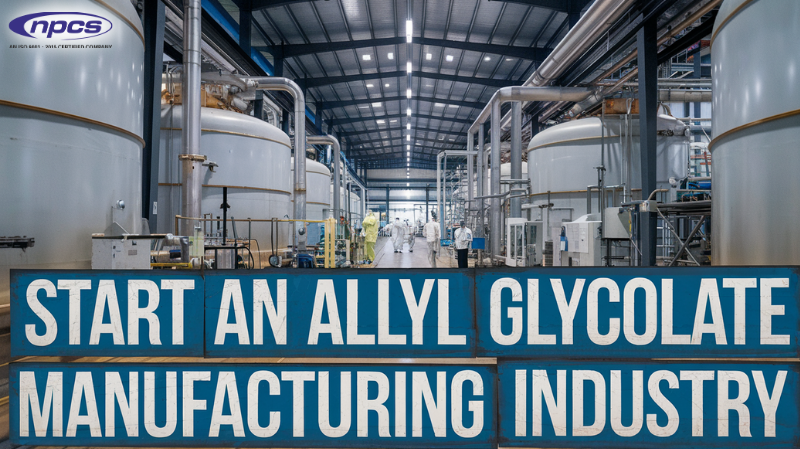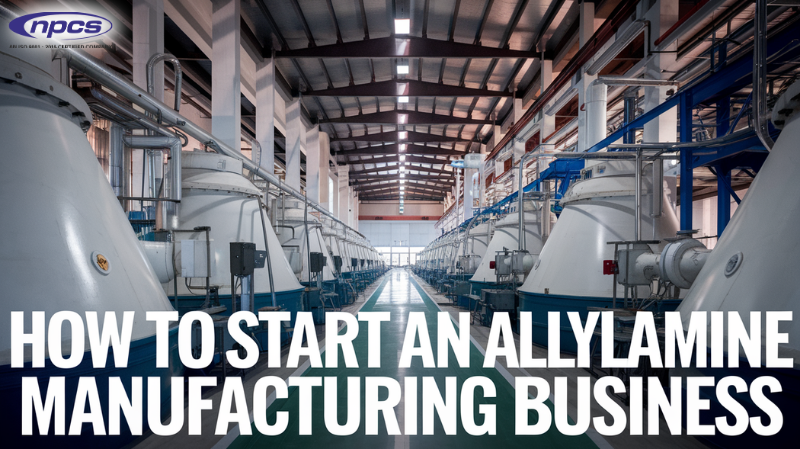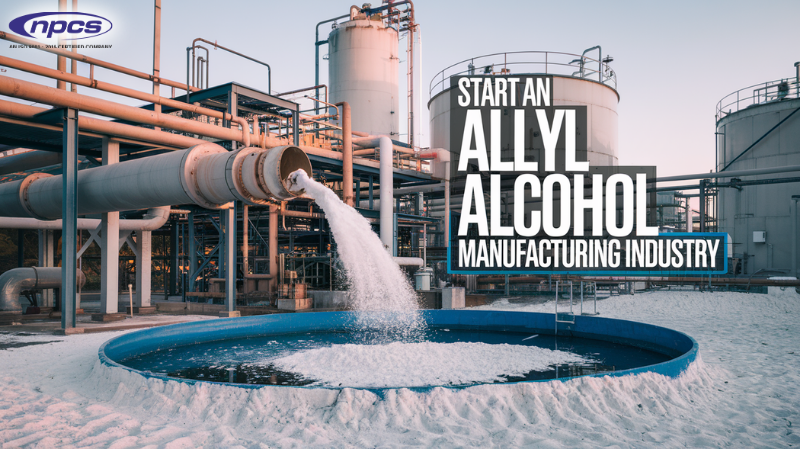Isopropyl Alcohol (IPA), which is generally known as rubbing alcohol, is a clear and volatile liquid with a nasty smell. This chemical is a secondary alcohol with the structural formula C₃H₈O. This compound finds applications in various sectors, including healthcare and pharmaceuticals. Additionally, it is utilized in electronics, cosmetics, and many other fields. Its widespread use can be attributed to its remarkable dissolving and germicidal properties. These characteristics make it a vital component in cleaning and sanitizing products.
Following the COVID-19 pandemic, IPA has become readily available worldwide. Its role has shifted from hygiene to a significant industrial commodity. The demand for IPA has increased, particularly for hand sanitizers and medical cleaning applications. It is also crucial for disinfecting surfaces in both industrial and personal settings.Thus considering the very high demand for IPA, it has suitable potential for making.
What is Isopropyl Alcohol (IPA)?
Isopropyl Alcohol is a kind of alcohol which is generally considered as rub and used for disinfection. It effectively eliminates harmful germs and provides thorough cleaning. Medical instruments and patient areas are meticulously sanitized with it.
The nursing and cosmetic industries also utilize alcohol effectively. In the perfume-making sector, alcohol serves as a crucial component for crystallization and as a cleaning agent. Additionally, alcohol plays an essential role in the production of cleaning agents and other important products.
Applications of Isopropyl Alcohol
The following are applications of IPA as a secondary chemical. Their descriptions, though, may hardly elaborate the extent to which the chemical is used. Therefore, they shall be ordered as follows:
- Medical and Healthcare: Serves as an antiseptic for disinfecting skin prior to injections, cleaning wounds, and also for sterilizing instruments and equipment. It is one of the most active components of ready-to-use alcohol solutions and rubbing alcohol.
- Cosmetics and Personal Care: Commonly included in aftershave balm, deodorants, and some cleaning products. It dissolves fat, produces a cooling effect on the surface of the skin where it is applied.
- Electronics: Excellent for use when cleaning the inside of a circuit board and other parts of a device as it does not corrode and dries very fast.
- Pharmaceuticals: It mostly cosolves with other agents used in solid dosage form preparation of different pharmaceuticals, as well as for cleansing medicinal facilities.
- Industrial Uses: Widely utilized within such things as paints, inks, coatings, and bonding agents. It emulsifies oils and other foreign substances thus making it ideal for industrial cleaning.
Join Us : Niir Project Consultancy Services
Niir Project Consultancy Services
Why Start an Isopropyl Alcohol Manufacturing Business?
There are many benefits of establishing an isopropyl alcohol manufacturing business owing to the high consumption of the product in question and the variety of uses it has;
- Growing Consumption: This is especially the case because there has been an increasing need for IPA in sanitisation and hygienic products in the global market, especially after the onset of the Covid-19 pandemic. And hygiene being of utmost importance, IPA will be in high demand for some time to come.
- Versatility of Usage: This nature of IPA makes it one of those products that have an enormous market. It does not matter whether in the health sector, in use as a household product, or as an industrial cleaning agent, IPA has numerous uses. This broad usage guarantees a viable and stable clientele.
- Economic Viability: The process of producing IPA is relatively cheap, and, furthermore, the main raw materials for its production (propylene, in particular) are affordable. In addition to the already existing high demand in the market, this makes the undertaking a business venture to look out for.
- Easy Market Entry: In contrast to other chemical production sectors, the manufacture of IPA has low financial investment and a straightforward manufacturing process. Because of these unique characteristics, there is an easy market entry for newcomers
- Government Sponsorship: There are many nations that encourage their citizens or firms to engage in the production of sanitizing and hygiene products. Particularly, this being the case, it is clear that if one were to set up an IPA manufacturing unit, in this case given the rising concern of hygiene one may even qualify for tax remission, grants or any other assistance.
Steps to Start an IPA Manufacturing Industry
- Research and Feasibility Study: In order to assist you in understanding demand as well as competition, pricing dynamics and customer profile, it is vital that you perform extensive market studies. A viability assessment deals with the potential problems posed by the undertaking and helps to appreciate the prospects of the market better.
- Procurement of Raw Materials: Isopropyl alcohol IPA is usually made from propylene which is a derivative of crude oil refining. It is important to build a consistent supply chain for this primary raw ingredient in order to facilitate uninterrupted production.
- Legal and Regulatory Approvals: A set of different licenses, permits, and legalities will be required for you to commence your business. These entails;
- A manufacturing license – To be issued from the local government agency responsible for manufacturing chemicals;
- Environmental clearance– Given that the process of manufacturing IPA will involve chemical operations, it is prudent that the manufacturing entity observes the environmental laws
- Fire and safety permits– Assures that the production facility adheres to all the requirements regarding fire and safety prevention measures control approved licensing.
- Pollution control certificate: This is very important to have in order to prove that the plant would not cause harm to the environment
- Location of the Plant Selecting: A Suitable site for the manufacturing plant is an important aspect that must be addressed. The plant should be situated near the sources of raw material and also close to the means of transportation. It should also comply with industrial zoning laws and environmental regulations.
Machinery Required for IPA Manufacturing
Establishing a production facility for isopropyl alcohol is not limited to the construction of a building only, as it encompasses several critical pieces of machinery and equipment, which include:
- Reactor Vessel: This component is needed to generate some of the reactions that will lead to the generation of IPA. In the reactor vessel, propylene is blended in with water or any other substances under certain conditions.
- Distillation Unit: Ethyl alcohol Isomer production for chemical purposes includes the steps of the distillation column. After the synthesis men in women pie up ibuprofen, a distilled solid. Rest out the repose is to keep the purity of the intermediate product.
- Heat Exchangers: These are utilized during the operational stage of the work as IPA Synthesis involves elevated temperatures. Heat radiators maintain the level of temperature favorable for the reactions only.
- Storage Tanks: Required for storing both the raw materials (such as propylene) and the final IPA product. Storage tanks should be designed to handle chemicals safely and must comply with safety standards.
- Filtration Systems: The manufacturing process has installed a filtration system that removes residual contaminants from the finished product in order to produce high purity IPA.
- Pumps and Compressors: Which are essential when pumping liquids and gasses in the production process. They facilitate the process of transporting raw materials and finished goods without delay.
- Quality Control Equipment: Quality assurance systems incorporate chemical standards to control the purity and composition of the IPA which is produced. That includes equipment for monitoring chemical concentration and other properties.
Feasibility reports on: Soda Ash
Production Method of IPA
The two primary ways of making Isopropyl Alcohol are:
- Propylene Hydration: In cases where propylene is hydrated, acid or water is present to obtain the IPA. This is a common technique used in manufacturing. The method is used to mix propylene with water and subsequently, fractional distillation is performed to obtain the dry IPA.
- Acetone Hydrogenation: Another one is acetone hydrogenation in which the acetone is transformed by means of hydrogen gas in order to make isopropyl alcohol. This is normally applied to production processes that do not require large scale operations.
The production process involves recycling and purifying isopropyl alcohol. It includes steps like distillation and filtration before it can be used for various applications. This approach ensures that industrial standards and quality requirements are met.
Growth Prospects and Future Trends for Isopropyl Alcohol Manufacturing Business
Otherwise known as isopropanol, the isopropyl alcohol manufacturing business shall look forward to some more active expansion over the coming years. And there is more than a single reason for that:
Rising Demand in Healthcare
Hospitals will still largely use commercial disinfectants containing IPA to properly disinfect medical equipment and working surfaces. A constant level of hygiene in healthcare settings will maintain the high consumption rate of IPA.
Increasing Hygiene Consciousness
Given the increased global focus on hygiene and cleanliness, the demand for IPA in hand sanitizers, cleaning agents, and surface disinfectants, will be quite high.
Expansion in Electronics and Industrial Uses
The growth in electronics production industries particularly in countries such as India and China presents yet another opportunity for IPA. Its safe nature means it can also be used to clean any electronic parts without the risk of damage, hence its market growth in industries
Sustainable Production Practices
Given the current state of the world, more people appreciate the necessity for ways of production that are environmentally friendly and sustainable. Future markets will reward companies that invest in energy-saving methods and waste minimization strategies.
Expanding Target Markets
The global market for eco-friendly isopropyl alcohol (IPA) is growing quickly. There is significant potential for exporting to more developed countries. The Asia-Pacific region is expected to lead in IPA demand. The increase in manufacturing in India and China is driving the need for IPA.
Conclusion
Setting up an isopropyl alcohol manufacturing business is illustrative of a business scope that is beneficial and advantageous especially considering the aspects of profitability, its many uses, and the demand in the market. There are effective strategies to enhance production levels. In your industry, safety is a top priority. Environmental considerations are also factored in. The outlook for long-term investments appears very promising. This is due to the favorable growth opportunities on the horizon.





